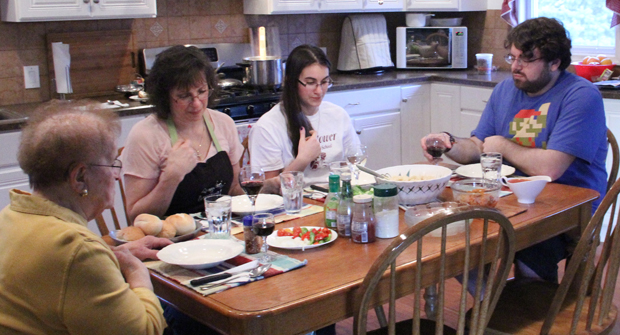This post is part of a series of six focusing on the Catholic church’s teaching on marriage and how it fosters the goods of: economic life, the church, civic society, fidelity, unity, and procreation.
In the gospel of Matthew (25:34), Jesus sets out the criteria for entrance into the Kingdom of Heaven. He says,
Inherit the kingdom prepared for you from the foundation of the world. For I was hungry and you gave me food, I was thirsty and you gave me drink, a stranger and you welcomed me, naked and you clothed me, ill and you cared for me, in prison and you visited me.
Then the righteous will answer him and say, “Lord, when did we see you hungry and feed you, or thirsty and give you drink? When did we see you a stranger and welcome you, or naked and clothe you? When did we see you ill or in prison, and visit you?”
And the king will say to them in reply, “Amen, I say to you, whatever you did for one of these least brothers of mine, you did for me.”
These acts make up so much of managing a household. My wife goes to the grocery store almost every other day, trying to feed her hungry kids, husband, and dog. I do laundry as fast as I can to clothe the naked, but the pile of dirty clothes builds up and spreads out to cover half of the basement. As a household, we burn through five gallons of milk a week to provide drink to the thirsty. We have a designated bucket in the house to bring to anyone who is sick, might be sick, or is worried that they could become sick. Every weekend, we welcome some kind of stranger, most often one of the kid’s friends for a sleep over or play date.
While these are not the only ways families love one another (the blog Parenting Mortification reflects on countless others), these corporeal works of mercy do not just point to how families love but also how this love is the kind Christ calls his followers to practice. It should not be a surprise, then, that the Catechism of the Catholic Church calls the home the “the first school of Christian life” (1657) and the Compendium of the Social Doctrine of the Church states that, “It is in the family that one learns the love and faithfulness of the Lord, and the need to respond to these.” (210)
This Christ-like love is not just shown by example. The Catechism also indicates that parents teach “by word” and so become “the first heralds of the faith with regard to their children.” (1656) In short, parents preach the gospel. This can occur in any number of ways. Parents read Bible stories to their children. Families often pray together. They gather for meals at Easter and Christmas. One of the most important aspects of the homily is the discussion that the family has about it on the way home from mass. Perhaps through these activities, perhaps through others, families become communities where the love that is practiced is reflected in the words that are shared.
Because love is practiced in word and deed, family life becomes sacramental. Section 1657 of the Catechism notes that families exercise their “priesthood of the baptized” by “the reception of the sacraments.” Families go to the sacraments and parents take their children to the sacraments, but the sacraments are not to be peak experiences isolated from family life. As Florence Caffrey Bourg noted in her book on the family, sacraments provide ways to understand ordinary family life and families add meaning to the sacraments. For example, having meals together are crucial for the health and well being of the family. The time together and the conversation keep family members connected to one another, and this reality points to the importance of frequent communion with God. Likewise, the Eucharist reminds the family that meals together, meals where love is shared, are times when God is present.
What stands out for me in this sacramentality of family life is reconciliation. It was an essential aspect of Jesus’ work, from his healing to his preaching and even to his death and resurrection. The church continues this ministry in the sacrament of reconciliation, a sacrament that helps to name sin, to strength the resolve to turn away from it, and to restore relationships with God and others. In family life, this is absolutely essential. Genuine love requires reconciliation. Couples do not last without the ability to address their failings, and children struggle to succeed if they do not learn how to handle conflict. This ongoing practice of reconciliation in the home—because all families are imperfect and struggle—points to our desire for good relationships and so points to the desire for true reconciliation. In the sacrament, we find that hope, that belief that “neither death, nor life, nor angels, nor principalities, nor present things, nor future things, nor powers, nor height, nor depth, nor any other creature will be able to separate us from the love of God in Christ Jesus our Lord.” (Romans 8: 38-39).
Because families practice love through their actions, preach the gospel by their words, and live together in ways that draw from and point to the sacraments, Catholicism refers to the family as an Ecclesia domestica (CCC, 1656), a domestic church. The family is a gathered people who try to live out Christ’s call to love God and neighbor.





Trackbacks/Pingbacks